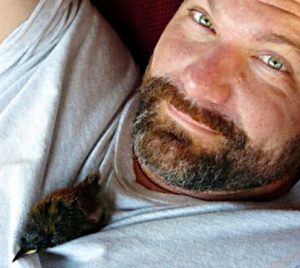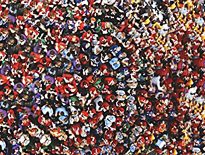John Bender – Question Everything

Today’s post is a profile of Guru investor John Bender, who appears in Jack Schwager’s book Stock Market Wizards. His chapter is called Question Everything.
John Bender
John Bender was an options trader who questioned the Nobel Prize-winning theory of option pricing.
- His entire methodology was based on betting against the pricing implications of the theory.
Bender graduated in biophysics from the University of Pennsylvania, and worked several scientific jobs over the summers of his course.
- But he didn’t like the thought of having to apply for research grants churn out paper rather than do research.
- He became interested in the markets as an alternative use of his math skills.
John Bender appears in Jack Schwager’s book Stock Market Wizards.
- His chapter is called Question Everything.
Bender’s story ends tragically.
- Years after his interview with Schwager, he bought 5,000 acres of rainforest in Costa Rica and established a game preserve.
John was bipolar and shot himself whilst in a depressive state.
- His wife Ann was accused of his murder, acquitted, then re-tried and found guilty.
Many suspect that this is linked to the seizure of assets in the trust established by John and Ann.
- Schwager has more on this here. (( I’ll revert to the present tense for the remainder of this article ))
Performance
Within a year of graduation, Bender had raised $80K to trade.
I was able to raise $80,000 from a few backers who were professional gamblers. Because I was a serious Go and backgammon player, I had met some of the world’s best backgammon and poker players.
Over the next six years, he compounded this at 187% pa, with only three losing questers.
- His worst decline was 11%.
Bender ended up with $7M after paying back his investors.
As I made more money, it became increasingly difficult to invest it trading only two or three stocks; it made sense to go off the floor in order to be able to diversify.
He launched a public fund the next year (1996) after taking a break.
- He reduced his leverage by 400% for the new fund, and returned “only” 33 pa for the next three and a half years (to Schwager’s interview).
The biggest decline for the public fund (which has hundreds of millions of dollars in assets) is just 6%.
- Bender also manages money for George Soros’ Quantum fund – in this case currency options.
Gambling
There are a lot of similarities between gambling and trading, although gambling is a bad term, because it implies that your results depend on luck. The people that I’m talking about look at poker or backgammon as a business, not a game of chance.
There are a few things that are essential to success in both trading as well as playing gambling games as a business. First, you have to understand edge and maximize your edge. Second, you have to be able to deal with losing. Third, you have to understand gambler’s ruin – not playing too big for your bankroll.
As a professional gambler or as a trader, you are constantly walking the line between maximizing edge and minimizing your risk of tapping out. There is no single right answer – it depends on the individual person’s risk tolerance.
As a fund manager, the correct answer as to how to maximize your edge will depend not only on your own risk characteristics, but also on your perception of the risk profiles of your investors.
Options
To make money in options, you don’t need to know what the price of the stock is going to be; all you need to know is the probability distribution [of a stock being at different price levels at expiration date].
The standard approach, which is based on the Black-Scholes formula, assumes that the probability distribution will conform to a normal curve.
Strictly, it’s a log normal curve, with price change of equal percentages in each direction being seen as equally likely.
All my trading operates on the premise that the most important part is the part that Black-Scholes left out – the assumption of the probability distribution.
Bender cites the impact of technical analysis – and its support and resistance levels and trends – as one reason why stock prices aren’t random.
- He also notes retail investor hysteria about hot sectors, such as tech (the interview took place during the middle of the dot com boom).
It’s not a matter of coming up with a one-size-fits-all model that is better than the standard Black-Scholes model. The key point is that the correct probability distribution is different for every market and every time period.
Each stock has its own probability distribution that depends on a host of factors: Who has what position? Where did the major buyers accumulate their positions? Where are their stop-loss points? What price levels are likely to be technically significant?
I get that information off the floors in the case of stocks and stock options and from the banks in the case of currencies.
The advantage of options in this situation is that they can be combined to form strategies that exploit the particular conditions in the market.
Bender tells a story about the gold market breaking through a key resistance point.
- If the breakout failed, a sell-off was likely as trend-followers abandoned the trade.
So an option strategy that made money from a big sell-off or a price increase was called for.
- A moderate sell-off was very unlikely.
With Black-Scholes, a small sell-off would seem more likely than a large one.
The same applies to a stock market or stock being driven higher by money inflows rather than intrinsic value.
- The most likely options are continuing to go higher, or a significant downward break.
A small decline is once again unlikely.
Media
As a policy, I don’t do interviews with the media. My feeling is that it is very difficult for a money manager to give an honest interview.
Why would I want to be interviewed and tell the world all my best investment ideas? Let’s say I have just identified XYZ as being the best buy around. Why should I go on TV and announce that to the world?
If I really believe that is true, shouldn’t I be buying the stock? The only time anyone touts a position is when they have it on and want to get out.
If you took the cynical attitude that all Wall Street recommendations are made to get the firm’s large clients or the firm itself out of positions, you would make money.
When I am estimating the price probability distribution for a stock, and a number of Wall Street firms put out buy recommendations on that stock, the chances of that stock dropping sharply become much larger. After two or three weeks, everyone who wanted to buy the stock has already bought it.
That’s the same reason why most fund managers underperform the S&P: They buy the trendy stocks and the stocks where all the good news is. They may be buying a good company, but they’re getting it at a bad price.
Conclusions
I’d never heard of Bender before I read this chapter, but I found him very engaging.
- It’s tragic the way his story turned out.
Schwager says that the message of the chapter is “question everything”.
The breakthroughs are made by those that question what is obviously “true.”
Schwager reference Einstein, but the whole of science makes progress that way.
A lot of options traders tweak Black-Scholes to make the model have fatter tails, but Bender seems to have taken this approach further by constructing individual modals for each market.
- In fact, he’s taken it so far that to me it doesn’t feel like a modelling exercise at all.
He’s a trader who simply uses options to get the greatest risk reward ratios for what he sees as the probabilities in a particular market.
- Which is the point of options to begin with.
Until next time.


















